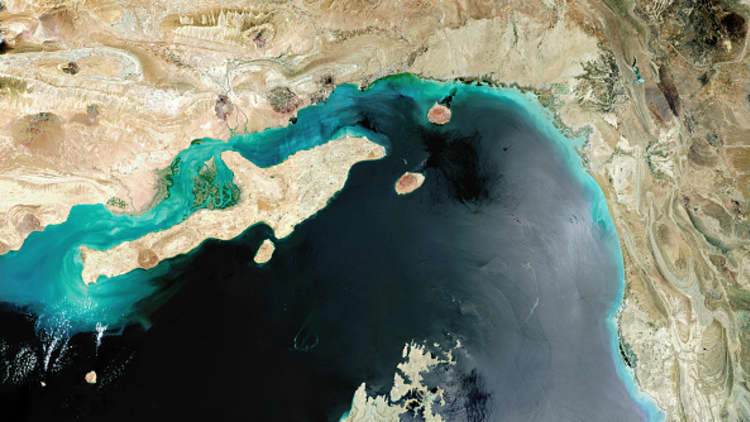Iran ramped up threats of retaliation for U.S. sanctions on its oil exports this week, with President Hassan Rouhani reiterating suggestions that his government could close the Strait of Hormuz, through which some 30 percent of the world’s oil shipments pass.
While this is in fact unrealistic due to the U.S. Fifth Fleet based in Bahrain, Iran is now more likely than ever to intensify attacks on American interests through its proxies in the region, confrontations with U.S. vessels in the Gulf, and cyberattacks.
“Iran could certainly resume confrontational skirmishes with U.S. vessels and intensify attacks on oil tankers through proxy groups such as the Houthis in Yemen,” RBC’s Global Head of Commodity Strategy Helima Croft said in a client note late Tuesday.
Tehran may be bluffing on the Strait of Hormuz, but its threat already sent oil prices up. Meanwhile, it’s all but certain the regime will increase support for its regional proxies Hezbollah in Lebanon and Syria, Shia militias in Iraq, and the Houthis – exactly the behavior the Trump administration seeks to deter, which will in turn lead to more U.S. sanctions.
Hostile threats
Risks have spiked following a war of words by U.S. and Iranian leaders. Rouhani, following a scathing speech by Secretary of State Mike Pompeo in which he called the Iranian regime a “kleptocracy” and a “mafia,” warned against threatening his government by suggesting that war with Iran would be “the mother of all wars.” Trump shot back Sunday night with a tweet warning that if Iran were to continue threatening the U.S., it would suffer “consequences the likes of which few throughout history have ever suffered before.”

Oil markets are jittery ahead of the August 6 deadline by which many sanctions on Iran will be reimposed by Washington as part of its withdrawal from the five-nation Iran JCPOA (Joint Comprehensive Plan of Action), which lifted sanctions on the Islamic republic in return for curbs on its nuclear program. Analysts expect Iran to restart its pre-JCPOA nuclear enrichment activities and recommence amassing its stockpile of highly enriched uranium.
The White House has mandated that all oil buyers cut crude imports from Iran by November or face stiff financial penalties. RBC projects a loss of 600,000 to 700,000 barrels per day (bpd) by the fourth quarter of this year, with losses likely surpassing 1 million bpd in the first quarter of 2019.
Harassment in Hormuz
Iran has a long history of aggressive responses to threats, and is already under pressure from public discontent amid a plummeting currency and an economy teetering toward collapse. The country’s gross domestic product (GDP) was projected to grow 4.3 percent this year before the U.S. withdrew from the JCPOA. Now, it is expected to see an annualized contraction of 5 to 8 percent and up to 50 percent inflation, according to political risk firm Eurasia Group.
The Iranian Revolutionary Guard Corps (IRGC) has apprehended U.S. naval personnel before and has used speedboats to harass American vessels.
“We’ve been seconds away from lethal incidents in years past,” noted Cliff Kupchan, Eurasia Group chairman, who described Trump’s greater proclivity to pull the trigger in a confrontation than his predecessors George W. Bush or Barack Obama. “A deadly encounter would be escalatory, to put it mildly.”
Iran’s cyber arsenal
Iran’s most flexible and immediate form of retaliation may not involve military force at all: cyberattacks.
“Iran has developed a potent arsenal, and cyber offers an attractive asymmetric path of retaliation,” said Kupchan.
Tehran could well hit the business sectors of U.S. allies in the region, he said, with Saudi Arabia being a likely target. The expert pointed to American corporates and the U.S. financial sector as potential victims, as well as politicians on whom Tehran can obtain compromising information through cyber means. Critical infrastructure would be another potential target, though experts are unsure if Iran’s hackers have that capability yet.
The U.S. and Iran have quietly waged cyberwar for more than a decade, set off between 2007 and 2011 when U.S. and Israeli intelligence forces reportedly deployed the Stuxnet virus to destroy computer-controlled equipment at Iran's Natanz Uranium Enrichment Facility. Since then, Iran’s cyber capabilities have advanced at a rapid pace.
Last September, the U.S. Treasury Department added two Iran-based hacking networks and eight individuals to a U.S. sanctions list, accusing them of taking part in cyber-enabled attacks on the U.S. financial system in 2012 and 2013, Reuters reported. Iran denied any role in the attacks.
Hackers believed to be linked to the Iranian government also attacked Saudi state oil giant Aramco in 2012, successfully wiping 30,000 computers and paralyzing operations.

Security experts have traced a number of subsequent attacks back to Iran, including hacks on Saudi and Western aerospace and petrochemical companies. Cybersecurity firm FireEye has said it detected coding containing Farsi references in the malware that hackers left behind. Last year it singled out Iranian hacker group APT33 as being behind numerous attacks on international aviation companies, saying it had the capability to cripple entire computer networks.
The U.S. intelligence community has already called attention to the vulnerability of America’s critical infrastructure, revealing detailed reports of penetration by Russian hackers. Director of National Intelligence Dan Coates said that the signs of an impending cyberattack were “blinking red” — and though he was referring to Moscow as perpetrator, his warning highlighted the threat of cyber warfare more broadly.
Despite the tough talk, neither Iran nor the U.S. appear willing to engage in direct military confrontation. But through the various means Iran can hit back at Washington, opportunities for nasty escalation are rife.
Croft’s RBC report summed up the fears of many regional experts. “While neither may want a war, a miscalculation and a potentially uncontrolled escalation could bring them to the brink.”


